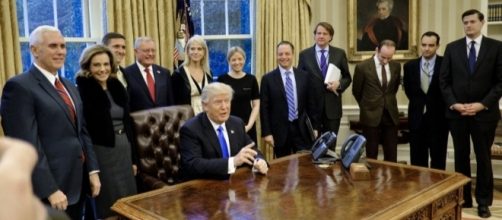Donald trump has already developed a reputation with the voting public for refusing to listen to traditional experts. His staff is already made up of “experts” Trump considers credible. Experts who have questionable research to support them along with fringe ideologies, many who are rejected by conventional experts; and yet have the power of the highest office to promote their agenda.
But according to those more conventional experts, he also doesn't have a smooth running government with close to 2,000 appointed and key cabinet positions -- such as deputy secretaries -- left to fill.
Much of this is due to the fact that Democrats are slow-walking confirmations of his nominees, people he has already named that Republicans would otherwise confirm.
Whenever the administration has been asked about filling these positions, they've repeatedly blamed Democrats for the delay. It's been reported that key positions currently left open are for four deputy secretaries of state, defense, treasury, and a deputy attorney general, who has been named as Rod Rosenstein who is scheduled for a Senate hearing during the week.
DOJ firings tighten up skeleton crew
President Donald Trump still hasn't named a number of key deputy secretaries to back up his Cabinet https://t.co/gsfYrbJ9Kv pic.twitter.com/VnyTZcT62k
— CNN Politics (@CNNPolitics) March 13, 2017
On Friday, Department of Justice (DOJ) Attorney General Jeff Sessions sent out a notification to 46 prosecutors left over from the previous Obama administration, asking them to tender their resignation immediately.
It's been widely reported that one of those prosecutors Preet Bharara who was initially asked to stay on by the Trump transition team last year. He refused to willingly resign and was quickly fired.
The news over the firings also highlighted the fact that this would impact pending investigations those attorneys were working on until other prosecutors could take them over, many of those positions are among those that have not been filled yet. And much like Preet Bharara, the Trump White House has asked Deputy Defense Secretary Robert Work to stay on for three months. But there is currently no information at to what long-term plans the White House has for the position.
A group among the mentioned field of experts on good governance is the Public Partnership for Public Service which says that in comparison with previous administrations, Trump lags behind with filling those appointments.
The president of that organization Max Stier described the importance of the roles taken by deputy secretaries as “chief operating officers,” but also said that despite the President not filling those positions, that most of those agencies are “operating amid strong uncertainty, with temporary career staffers holding these positions,” according to one report by CNN titled “trump administration slow to name deputies.”
Blaming the opposition
These are the Senate Democrats who we know voted for Trump's nominees. https://t.co/PhYRKae5MP via @slate
— Joshua Kricker (@jokr1822) March 8, 2017
The article also refers to a White House spokeswoman Lindsey Walters who sided with blaming Democrats for what she called “their shenanigans,” saying that if they had just confirmed those picks from the beginning, the White House would be in a different position.
But the suggestion that Democrats could have confirmed his picks from the beginning goes to the combative nature of the Trump administration who believe they are at constant war with their opposition and even against the process those picks have to go through to be confirmed. With that argument, it's also been noted that most of these open positions do not require Senate confirmations and yet they have not been filled.
There is also the pressure the Office of Government Ethics has put on his nominees for being fast tracked by the Senate too quickly before they could be vetted, bringing many of their conflicts of interest to light. Their process has even put enough pressure on those nominees forcing them to withdraw their consideration, such as Philip Bilden for Navy Secretary, Vincent Viola for Army Secretary and Andy Puzder who was nominated as Labor Secretary, all of which are top positions. The CNN article also points out that President Trump had already named his nominees for top positions by Inauguration Day.

